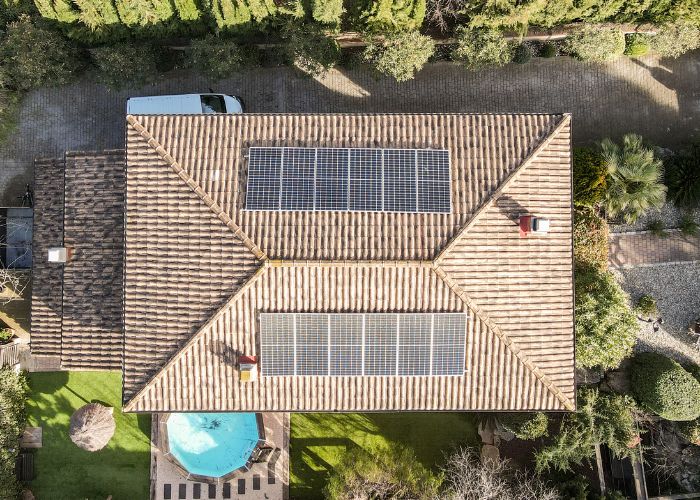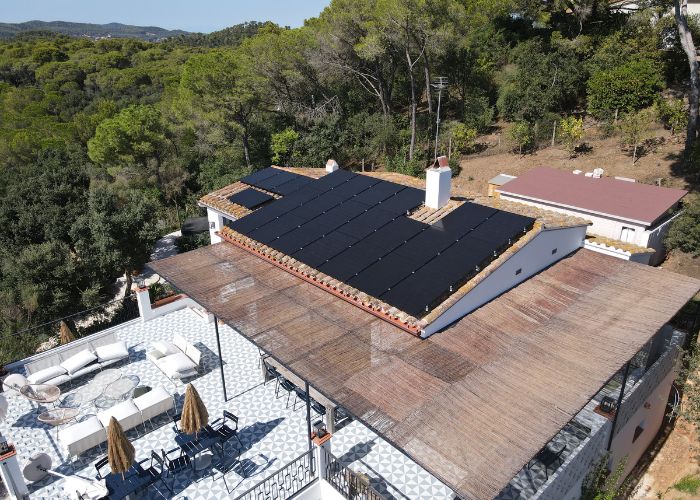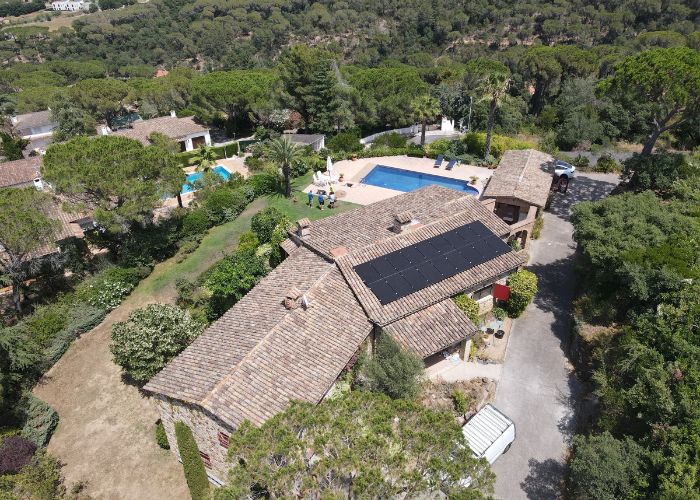Solar panels in Spain have burst into the population with great success, taking advantage of the sun’s rays to produce energy in our homes. Without going any further, in 2021, self-consumption marked a record year with an increase of more than 100%, reaching up to 1,203 MW installed.
This strong growth of solar energy in Spain is partly due to the world in which we currently live, increasingly concerned about energy savings and the increase in greenhouse gases in the atmosphere that are harmful to the environment. As a solution to this problem, new technologies have emerged that aim to reduce the carbon footprint and become key to the sustainability of the planet.
However, there is still a notorious lack of knowledge about the installation of solar panels and how the regulatory framework works in Spanish territory. Consequently, in this article, we will provide you with the necessary information about the operation of solar panels in Spain. Here, we will expand on the following:
- What is a solar panel and how does it work
- What are the components of a photovoltaic installation
- How an installation of solar panels is carried out in Spain
- Prices of a photovoltaic system
- Profitability
- Maintenance
- Uses and applications
What is a solar panel and how does it work?
Solar panels are elements that transform the sun’s energy into electricity. But how is all this energy produced for domestic consumption? Thanks to silicon, the main component by which a solar panel is made, the modules capture the sun’s photons (or light particles) and transform them into electrons.
That said, the solar inverter converts the direct current (DC) produced by the system into alternating current (AC) suitable for the energy consumption of our home. For this reason, it is an essential component in any installation and is referred to as the “brain” of the system.
There are specific cases where we can generate more energy than consumed. In this case, you will have the option of obtaining financial compensation for those surpluses. However, you can install solar panels that store excess energy to use at night.
Components of a photovoltaic installation
Solar panels are not the only element that makes up a photovoltaic installation. For the system to work 100%, other fundamental devices allow the transformation of energy into electricity. However, here are the main components of an installation:
- Photovoltaic modules
- The solar inverter
- The smart metre
- Batteries (It is an optional device if you want to maximise energy savings and depend less on the traditional electrical network)
In any case, solar panels are not simply placed on the roof. They are assembled on a structure previously fixed to the roof that guarantees optimal inclination together with a correct anchorage that provides you with security.
Other components involved in the installation are the wiring, like those applied in electrical installations, and the bidirectional metre, which keeps track of the energy consumed.
What is the process of installing solar panels in Spain?
Before proceeding with the installation of the solar panels, the house must meet a series of conditions. Firstly, a study of the roof will be carried out by the installation company. The installer will review the conditions of the roof and analyse the orientation and slope. Then, if the company verifies that the conditions are favourable, the process will continue.
It is important to know that solar panel installations in Spain MUST be carried out by certified installers, otherwise it will not be legal.
From this moment on, you must comply with some requirements related to the legal part of the system. Moreover, you must present the procedures established in Spanish regulations. That is, the necessary permits to proceed with the installation of solar panels both before and after the work.
Then, the steps to follow in a photovoltaic installation are as follows:
- Assemble the structure
- Fix the structure to the roof
- Fix the solar panels
- Connect to power inverter
- Connection to electrical panel
Of course, do not forget to legalise the system to carry out these steps. To do this, it is important to follow these guidelines:
- Hire an authorised certified installer.
- Register the photovoltaic system through the corresponding Ministry of Industry.
- Validate the system by Industry. If documentation is missing, it will be requested in this step.
- Sign the contract for the compensation of surpluses. You will have a maximum period of 10 days to confirm.
The prices of solar panels in Spain
The advances produced in the development of renewable energies have provoked significant decreases in the cost of solar panels, turning solar energy into a cheaper alternative source for Spanish homes. Therefore, talking about prices implies taking into account materials, labour and legal procedures. In addition, the prices will always be indicative. Variables such as the energy consumption of each home, its location or the taxes set by each autonomous community affect the price.
The following SolarMente prices are an indication of the estimated costs:
Solar panels Price:
- M Kit: €6,786
- L Kit: €8,114
- XL Kit €9,538
But, if you want to add batteries to your system, that would be an additional cost to the prices indicated above. Although it requires a greater investment, you will obtain higher energy and economic savings in the long run. Alternatively, if you do not have enough budget to cover the initial investment, you can opt for a solar subscription model.
By renting your solar panels you will pay a reduced monthly fee and you will continue saving on your electricity bill while enjoying all the advantages of self-consumption.
Profitability of solar panels: is it worth betting on solar energy?
The profitability of solar panels is determined by the following factors:
- The price of the installation
- The aid and subsidies received
- The amount of energy produced
- Savings on the electricity bill
- Compensation of surpluses
With an average of 2,500 hours of sunshine per year, Spain is proclaimed as one of the sunniest geographical areas in Europe, surpassing neighbouring countries such as France and Portugal. Furthermore, this data is a clear example of the potential for energy production in said territory.
Since the legislative changes produced in 2018 with the repeal of the sun tax and the elimination of numerous bureaucratic barriers, there has been a significant growth in solar energy in Spain.
Likewise, the Government and the Autonomous Communities are promoting self-consumption through aid and subsidies in the installation of solar panels such as IBI and ICIO tax rebates, as well as reductions in personal income tax or other specific regional aid.
It is true, however, that these aids are a plus that accelerate the return on investment. But if we had the chance to receive them, the photovoltaic system would continue to be profitable since we are self-consuming energy. Consequently, this could cause a reduction of as much as 50% in the electricity bill.
In the same way, although it is not a significant economic retribution, you can obtain compensation for your generated surpluses if you pour them into the electricity grid.
Maintenance of solar panels
Installations with photovoltaic panels need hardly any maintenance. They are made of materials that tolerate all types of weather phenomena. Therefore, installing a solar system in your home does not require much attention. Moreover, you only have to clean the modules 3 or 4 times a year. This will keep the surface free of dust and other debris that could make it difficult to maximise power output.
To do an effective cleaning you will need:
- A hose or a bucket with plenty of water
- A non-abrasive cloth or sponge to prevent damage to the system
This last element will only be necessary to use if the dirt does not disappear with washing.
Regarding the replacement of defective parts, they will be changed at no cost as long as they are under warranty. However, if you have rented the solar panels, the installation company will take care of renewing the components in that case.
Uses and applications of solar panels
The versatility of solar panels will not only allow you to enjoy solar energy in your home, but they also have multiple uses. Here are some of them:
- Public and private lighting
- Pool
- Heating
- Irrigation
- Hot water
- Transportation
As you can see, solar energy has indisputable potential in Spain.
The installation of solar panels in Spain is a guaranteed investment
Installing solar panels in Spain means significant financial savings from day one, making you the owner of your energy. Similarly, the use of renewable sources such as solar energy leads us to an energy model based on sustainability. You are putting aside fossil fuels to reduce pollution and curb climate change.
Given the volatility of electricity prices is becoming more noticeable, photovoltaic installations are being the main protagonists for having an increasingly competitive price and great potential in a country where hours of sunshine abound.
For more information about self-consumption in your home, click here and discover all the benefits you will get from using a renewable and clean energy source.
This article is created for InSpain.news by the SolarMente team, a solar energy company at SolarMente.es.





